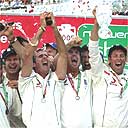Aussie Victorious is A Matter of Pride
 If you've found recent media coverage of the Ashes excessive, both in that which has spilled over from the cross channel outlets, and also the fact that it gets any attention at all in this country, then you'll be delighted to have seen the English wickets tumble this morning, in that familiar way they had of doing so in the not-so-distant past.
If you've found recent media coverage of the Ashes excessive, both in that which has spilled over from the cross channel outlets, and also the fact that it gets any attention at all in this country, then you'll be delighted to have seen the English wickets tumble this morning, in that familiar way they had of doing so in the not-so-distant past.The loss of the second test and the destruction of an English nerve that snapped under the irresistible weight of Shane Warne's genius should see English cricket's giddy garlands of the summer of 2005 folded up and put away, to be looked back on only in quiet moments of repose.
The shellshocked English cricketers will be feeling bad enough today, as that prized urn and those happy memories slip further away. The full force of Australia Victorious, however, will only worsen their demeanour.
There is, probably, no worse place to be a loser, and no worse loser to be, than an Englishman in Australia. England as a nation does not have its enemies to seek, and there would appear to be far more rancourous historical foes around than the Aussies, whose original flowering was, after all, from relatively recently planted British seed.
But it is precisely that closeness that infuses the bile into the nations' sporting conflicts. The shared language only allows the insults to be more easily understood.
Any young nation - and there are few younger than Australia, for whom the tragedy of Gallipoli as recently as 1915 is regarded as the source wellspring of their national identity - must establish itself and its independence as distinctly as possible from that of its 'mother' country, or that which had previously dominated it.
In Ireland, Eamon De Valera's controversial policy of economic self-sufficiency and total diplomatic independence from Britain was conceived to bolster and iron-cast the new nation's separate status. By remaining neutral in the Second World War and, in the process, enraging Winston Churchill through his refusal to allow the use in that conflict of the so-called 'Treaty Ports', De Valera intended to underline to the world the distinctiveness of the Irish nation.
Australia's disengagement from Britain, on the other hand, was gradual, bloodless and incomplete, the country coming into existence in 1901 as the Commonwealth of Australia, retaining to this day, of course, the Union Jack on its flag and the Queen as its Head of State.
But the Australians have a special enmity for the English, and it is clearly that of the younger sibling towards his elder, or the troubled teenager toward his overbearing parent.
None of this stops them sending their youthful population to work in English pubs, or from engaging enthusiastically with English culture - The Bill is phenomenally and mystifyingly popular in Australia, as, more understandably, are the traditional British sitcom and the meat pie (which they have perfected into a artery-solidifying wonder).
But the gory glee taken in their sporting defeats of the English speaks of their own Treaty Ports: the unbending and bitter pride they take in their excellence on the sports field, and the values they celebrate therein.
The scorn heaped on the invariably whinging Poms is intended to 'barrack' - a quintessentially Aussie term for vocal support - for what the Aussies see as positive in themselves: manly athleticism; a steely, hardbitten character; the uncompromising pursuit of victory.
Social anthropologists might speculate on how the taming of that harsh continent imbued these virtues, but however they came about, the sight of a bunch of Englishmen whimpering and folding to defeat this morning will have enthused any Aussie worth his salt.
Ian Bell's dithering dismissal - run out when seemingly caught in a funk as Paul Collingwood called to him for a single - and Ashley Giles' greasy palmed drop earlier in the test would have been seen as encapsulating everything the lack of which made Australia great.
There might not be much more attention paid to these Ashes around these parts now that the series is effectively over, but those unfortunate Englishmen will hear plenty about it for the next few weeks.
Its a matter of national pride.
....Read more!







